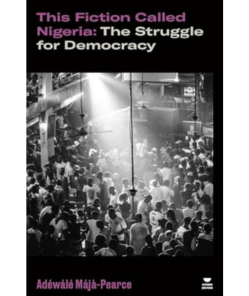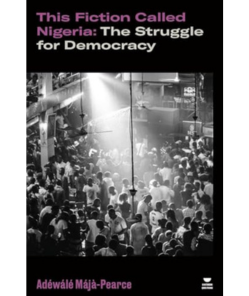Book Recs, Book Reviews
Review of This Fiction Called Nigeria: The Struggle for Democracy by Adewale Maja-Pearce
Reading Adewale Maja-Pearce’s This Fiction Called Nigeria: The Struggle for Democracy is like peeling back the layers of a country’s hidden struggles. The book reveals surprising facts about Nigeria’s politics and history, challenging what many people assume to be true. Through a collection of essays, Maja-Pearce gives an unfiltered look at Nigeria’s national identity and democracy, showing how things aren’t always what they seem.
The book paints the idea that Nigeria isn’t really a unified nation. Instead, the writer argues that it was pieced together by colonial rulers without considering whether the different ethnic and religious groups could truly come together. Many may have heard/read of Nigeria’s colonial past, but the writer makes it clear just how much those divisions still shape the country today.
The author also discusses the Biafran War and how its effects are still felt across the country. For those unfamiliar with the country’s deep ethnic tensions, this book makes it clear that these divisions are not just part of history but still influence our politics and daily life. It’s an eye-opening realization that Nigeria’s problems are not just about bad leadership but about deep-rooted identity struggles.
Another area the author highlighted is how democracy in Nigeria often feels like an illusion. Many people believe that Nigeria, as one of Africa’s largest democracies, follows fair elections and democratic principles. However, Maja-Pearce exposes the reality of widespread corruption, rigged elections, and political violence.
One of the not so shocking revelations is just how embedded corruption is in the political system. The book doesn’t just criticize Nigerian leaders, it also shows how foreign governments and organizations have played a role in keeping this corrupt system in place. This forced me to reconsider the idea that outside influences always help struggling democracies; in Nigeria’s case, they sometimes make things worse.

The Role of Media and Civil Society: Most people assume that journalists and activists are fighting against corruption and pushing for democracy. While this is true in many cases, This Fiction Called Nigeria reveals another side of the story. The book explains how the media and civil society have been weakened over time, either by government control, threats, or bribery.
As a reader who believes in the power of free press and activism, it’s unsettling to realize that even these forces can be manipulated. The government and powerful elites have ways of silencing critical voices, either through intimidation or by influencing what stories get reported. This forced me to rethink how easy or difficult it really is to challenge those in power.
The book is guarded with its ability to challenge what readers think they know. Maja-Pearce doesn’t just list Nigeria’s problems, he digs deep to explain where they come from and why they continue. He also uses historical examples to help readers understand that today’s issues are not new but part of a long, ongoing struggle.
Another shocking detail is its fearless criticism of those in power. Unlike some accounts that make excuses for Nigeria’s problems, Maja-Pearce lays them out as they are. He makes it clear that the failures of democracy and governance are not accidents but the result of deliberate actions by those who benefit from the system staying the same.
While the book is informative, some readers may find its format a little difficult to follow. Since it is made up of different essays, there isn’t a single storyline or a step-by-step historical account. Instead, they’d have to connect the dots between different essays to fully understand the bigger picture.
What I believe might be a challenge, is that the book is very critical and does not spend much time highlighting positive changes or efforts to improve Nigeria’s situation. While the critique is necessary, some readers might feel overwhelmed by the negativity and wish for more balance by including examples of progress or successful reforms.
Ultimately, the book leaves you with an unsettling but important realization: Nigeria, in many ways, is still more of an idea than a functioning nation. It forces readers to reflect on whether true change is possible and what it would take for Nigeria to move beyond its struggles and towards real democracy. While its structure and highly critical tone might not be for everyone, the insights it provides make it an essential read for those wanting a deeper understanding of Nigeria.
About the Writer: Manuella Owukio is a storyteller at heart, whether she’s deep in a novel or helping others shape their own. With a sharp editorial eye and a love for all things literary, she loves books filled with uncertainties and information that leave your mind blown for days on end. When she’s not knee deep in books, she dabbles in social media management helping brands maintain top notch images online and offline.
This Fiction Called Nigeria: The Struggle for Democracy


